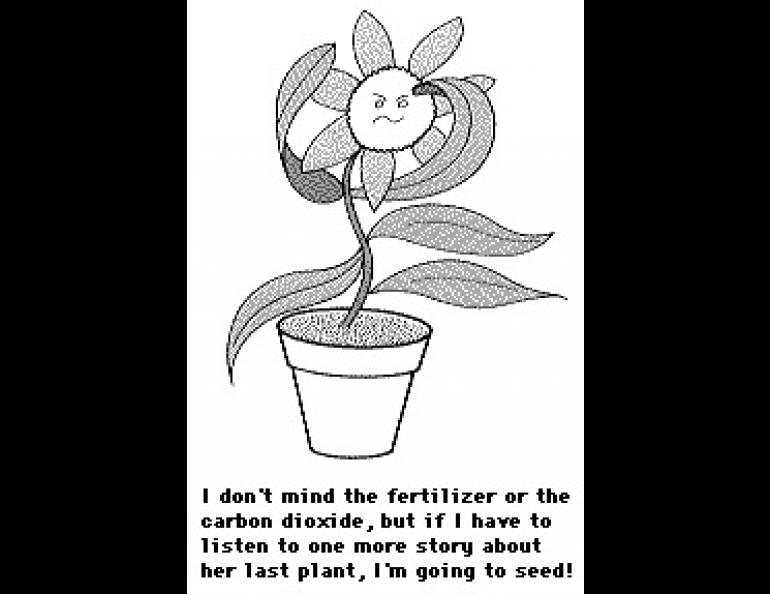
Talking to Plants
Do you talk to your plants? Do you think it helps them grow better? How could you tell if talking really helped a plant? Listen to a conversation I once had -- with a fellow human, of course.
"I know that talking to my house plants is good for them", my friend said. "I took two plants and talked to only one of them, and the one I talked to was healthier than the other."
"It's good that you used two plants and compared them, so you had a control," I replied, "but are you sure that the two plants were treated exactly alike in every way except being talked to? Were they getting the same amount of light, and was someone else taking care of watering and fertilizing them?"
"Well, they were in similar windows, but why should it make a difference who watered them?"
"Do you look at your plants when you talk to them?"
"Well, of course."
"And if you notice that they need water or fertilizer, do you give it to them? Or bathe them if they have aphids of spider mites?"
"Certainly. Why shouldn't I?"
"You should, if you want a healthy plant. But if you are talking to one of your plants, you are noticing that plant more, and you're going to take care of that plant better because you see right away if it needs care. The plant you're not talking to, your control plant, is a lot more likely to dry out or be damaged by insects, because you're not paying as much attention to it. The only way to be sure your talked-to plant is not doing better just because you take better care of it in other ways is to have someone else, someone who doesn't even know which plant you're talking to, do all of the feeding and watering and stuff. The person who's doing the talking shouldn't even communicate with the caretaker. And the person who finally decides which plant is doing better shouldn't know which plant is being talked to, either."
"Do you mean that if I saw the plant needed water I couldn't even tell anyone to water it?"
"That's right. It's sort of like a double-blind drug test, when neither the doctor nor the patient knows who's getting the drug being tested and who's getting something else."
"Don't drug tests take a lot of people, though?" my friend wondered.
"Yes, and do you know why?" I responded.
"I suppose because sometimes people might get better in spite of the drug instead of because of it?"
"Right, and the same is true of plants. Did you ever know two plants treated exactly the same to grow exactly the same?"
"Well, no. Usually one's stronger than the other."
"So even if talking to the plant had no effect at all, you would expect that about half of the time the talked-to plant would do better. If a hundred different people did this experiment we've been talking about, half of them would find the plant they talked to would be healthier, even if in fact the talking had no effect at all. And these fifty people would be the ones who talked about the results, while the others would probably keep quiet, since their experiments 'failed'. So if the experiment is going to mean anything, it has to involve a large number of pairs of plants."
My friend looked dubious. "It's starting to sound like an awful lot of work to prove that talking to plants helps them."
"It certainly would be, which is probably why as far as I know it's never been done. But don't let that stop you from talking to your plants -- if it helps you notice their needs, then it's good for them, even if they don't hear you. And the moisture and carbon dioxide in your breath are good for them, too. Just don't expect them to answer back!"




